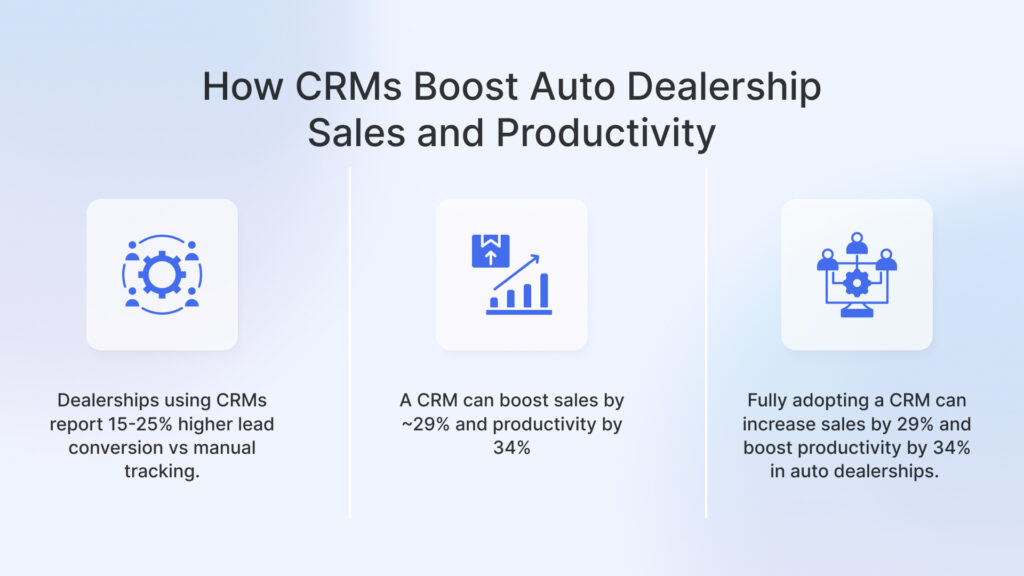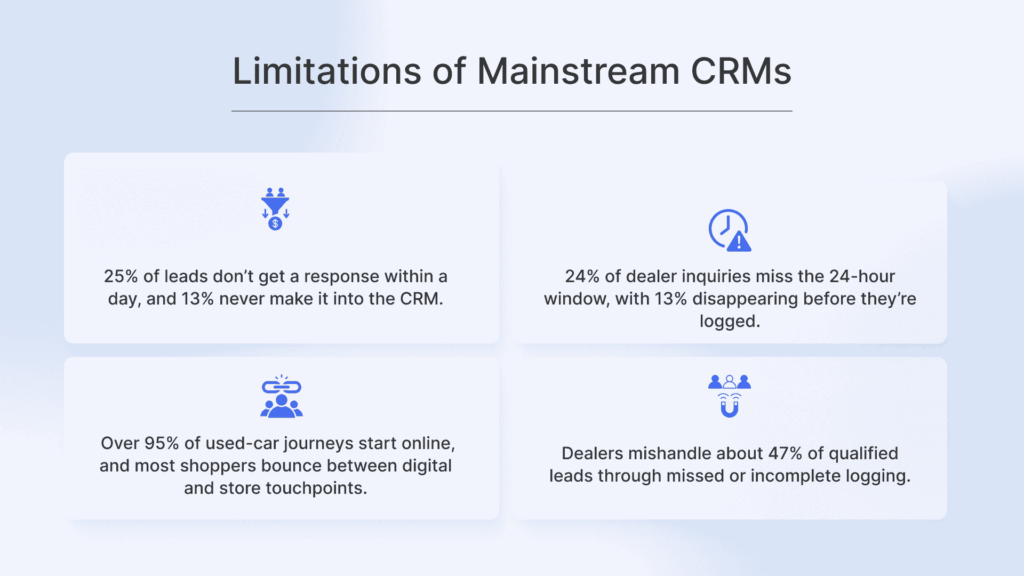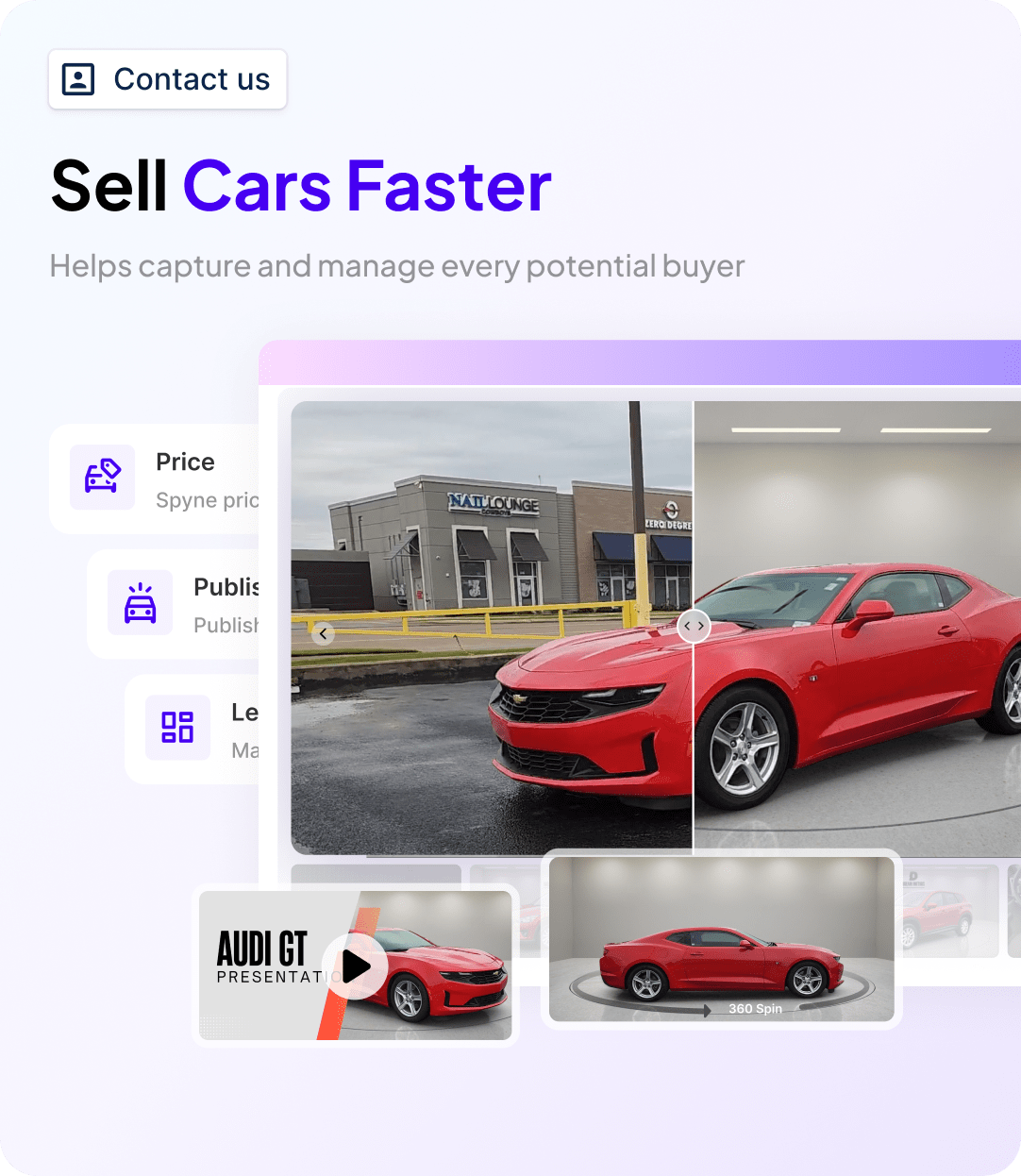Dealerships handle a steady stream of calls, chats, and showroom visits, and keeping everything organised is key to clear communication and timely follow-ups. An automotive CRM helps teams track enquiries, maintain consistent outreach, and stay aligned through each stage of the buyer’s journey. In this blog, we’ll break down what automotive CRM software actually delivers, and how it becomes far more powerful when paired with modern AI workflows.
What is Automotive CRM?
An automotive CRM is a purpose-built system that helps dealerships manage customer relationships, streamline sales work, and stay organised across every enquiry. It pulls lead data into one place, coordinates follow-ups across calls, texts, and showroom visits, and supports after-sales service with a clear history of what each buyer needs. Its core functions include:
- Lead flow clarity: every inquiry shows up with source, intent signals, and next-step tasks.
- Conversation management: texts, calls, and emails stay threaded so teams don’t lose context.
- Customer timelines: purchase history, service visits, notes from different departments, and preferences sit in one record.
Reasons Every Automotive Dealership Needs a CRM Today
Dealerships rely on CRM systems to keep every customer touchpoint organized and to guide core business decisions. The right platform surfaces clear sales metrics, highlights individual rep performance, and supports deal structuring without extra overhead.
Across single stores or large groups, an automotive-focused CRM anchors a modern, competitive operation. Pairing it with AI-ready workflows helps teams move quicker, convert stronger, and cultivate higher lifetime value.

Benefits of Using CRM in Automotive Industry
Selling and servicing cars involves dozens of touchpoints, and without a system to organize them, dealerships lose time, leads, and repeat business. Below are the benefits of an automotive CRM software tool:
- Enhanced Personalization: Unified customer details help staff deliver tailored interactions across sales and service.
- Stronger Engagement: Automated reminders and timely outreach keep every customer informed and connected post-purchase.
- Faster Sales Momentum: Lead tracking and guided workflows support smoother follow-ups and quicker deal movement.
- Smarter Marketing: Customer insights fuel targeted campaigns with offers that match shopper intent.
- Streamlined Operations: A centralized hub cuts back-and-forth and gives teams clear visibility into every interaction.
- Service Consistency: Automated maintenance prompts and accessible service histories help keep bays filled and customers satisfied.
How to Choose the Right Automotive CRM Software?
Selecting the right automotive CRM provider means you’re choosing how your dealership will manage leads, customer relationships, operations, and growth. While evaluating various automotive CRM systems, consider the following factors to find what best fits business needs:
#1: Clarify What Your Dealership Wants to Achieve
Start by grounding the decision in your dealership’s goals. Be specific about the desired outcome, then turn those expectations into measurable KPIs. Ask questions like:
- How does CRM help sales, BDC Teams, and what gaps does a CRM for automotive fix immediately?
- How will automotive CRM systems speed up lead response and boost show rates on the floor?
- Can the automotive dealership CRM help sales and service data in one view without missing context?
#2: Build a Shortlist Based on Real Automotive Fit
Once the goals are set, shortlist platforms built for dealership environments. Many dealers test their top choice with a small pilot group. A quick two-week run often reveals how leads flow, how reps adapt, and whether reports align with managers’ expectations.
While evaluating options, look for these features in an automotive CRM system:
- Scalability: Should handle growing lead volume and additional rooftops.
- Integration depth: Must sync cleanly with your DMS, digital retail tools, and marketing systems as part of your automotive CRM integrations.
- Ease of use: A simple interface encourages daily use across sales, BDC, and service teams.
- AI readiness: Look for support for automated follow-ups, enrichment, and conversation intelligence.
- Onboarding & support: Responsive setup help and clear training paths speed up adoption.
#3: Set Clear ROI Benchmarks to Measure Performance
Before choosing an automotive CRM software, outline the outcomes you expect it to influence. Track essentials like lead response time, appointment show rate, close ratio, salesperson productivity, and service retention.
#4: Check System Compatibility
A dependable automotive CRM should sit comfortably inside your existing workflow. When it connects with your DMS, ERP, inventory tools, and service systems, teams get one steady view of every update, nothing scattered, nothing re-entered.
How to Implement the Automotive CRM Software?
Now that we’ve outlined how to choose an automotive CRM for your business, we’ve also laid out a foolproof implementation plan that prevents messy data, reduces staff frustration, and speeds up adoption.
Step 1: Set goals that define what you want to speed up, track, or retain, backed by clear KPIs.
Step 2: Choose a CRM that fits your daily rhythm, plugs into existing tools, and scales with demand.
Step 3: Migrate only clean, corrected data so reporting and automation stay reliable from day one.
Step 4: Build strong CRM adoption with focused automotive CRM training, early onboarding for new hires, and steady support to keep workflows consistent and performance rising.
Step 5: Connect the CRM with your DMS, communication stack, website, and marketing tools for smooth data flow.
Step 6: Review early usage, catch friction points, and tune workflows to cement long-term adoption.
7 Best Automotive CRM Providers For Dealers
Here is a list of some leading AI-enabled automotive CRM companies, each designed to help car dealerships and auto repair shops:
Spyne
Spyne delivers an AI-driven automotive CRM that ranks leads, automates follow-ups and keeps inventory and listing visuals updated across channels. It supports sales and BDC teams with instant responses, call tracking and a 24/7 virtual receptionist designed to reduce missed opportunities in high-volume stores.
Key Features
- AI lead scoring & routing
- Automated follow-ups + 24/7 virtual assistant
- Call & conversion analytics
- Inventory + listing visual management
- Service-lane & workflow integrations
Best For: Dealers wanting an AI-native CRM built entirely around automotive retail.
AutoRaptor CRM
AutoRaptor focuses on fast follow-up, clean workflows and easy adoption for independent and small franchise stores. It simplifies task management, helps sales teams stay organized and offers mobile-friendly tools for scanning licenses and VINs, making it practical for frontline activity.
Key Features
- Automated workflows & reminders
- Lead, task & pipeline management
- Role-based dashboards
- Mobile license/VIN scanning
- Simple plans & setup
Best For: Small and midsize dealers seeking a lightweight, practical CRM.
VinSolutions (Connect CRM)
Connect CRM manages the entire customer lifecycle with desking, DMS syncing and integrated marketing tools. It pulls real-time inventory, incentives and lender data into one system, giving sales teams a clearer path from lead to structured deal.
Key Features
- Integrated desking tools
- DMS syncing & customer record unification
- Automated marketing campaigns
- Multi-channel communication hub
- Integrations with advertising & valuation tools
Best For: Franchise dealerships needing strong desking + DMS connectivity.
DealerSocket CRM
DealerSocket unifies CRM, desking, marketing, inventory and digital retailing under one ecosystem. It helps stores streamline customer management, automate equity mining and run more profitable workflows with OEM-aligned tools and mobile capabilities.
Key Features
- OEM integrations
- Service appointment scheduling
- Marketing automation & equity mining
- Desking + credit qualification
- Mobile CRM & digital retailing
Best For: Dealers wanting an all-in-one retail platform instead of multiple tools.
DriveCentric
DriveCentric centers on high-engagement communication with real-time inventory and unified texting, emailing, video messaging and call management. AI insights help teams understand customer intent, while mobile tools support fast, conversational follow-ups.
Key Features
- Real-time inventory
- Text/email/video messaging in one hub
- AI engagement insights
- Automated follow-ups
- Mobile CRM for sales teams
Best For: Dealers using video and conversational selling to close more leads.
Selly Automotive
Selly is built for independent and used-car dealers, offering quick setup, AI-powered follow-ups and broad integrations with marketplaces and DMS partners. It streamlines routing, messaging and after-hours engagement without adding complexity.
Key Features
- AI lead automation & summaries
- 100+ marketplace/DMS integrations
- SMS & email workflows
- Inventory syncing
- Mobile-friendly design
Best For: Used-car stores needing an affordable CRM with strong automation.
CDK Global CRM
CDK CRM connects tightly with CDK’s DMS, giving large groups a unified workflow across sales, service and marketing. It supports structured retailing, document management and enterprise-level reporting while providing consistency across rooftops.
Key Features
- DMS-integrated CRM
- Sales, service & marketing workflows
- Digital retailing tools
- Document management
- Multi-store analytics & reporting
Best For: Large dealer groups needing deep CRM–DMS alignment and enterprise scale.
Why are More Dealers Choosing AI-Compatible Automotive CRMs?
More stores are moving to AI-ready CRMs because buyers expect fast, tailored replies, and a standard CRM system can’t maintain that pace under load. AI can manage 24/7 engagement and step in as both customer support and an automotive answering service for routine questions, updates, and scheduling.

Once both systems run in sync, reply times drop, messaging stays uniform across every channel, and the store gains a clear edge with buyers who stay with the team that responds first.
What Makes Spyne a Reliable Automotive CRM Option for Dealerships?
Spyne is purpose-built for automotive retail and shaped around the pain points dealership sales teams face, with automotive CRM features like:
- Centralised Lead Management
- Instant Lead Responses / Automated Follow-ups
- AI-Powered Lead Prioritisation & Assignment
- Performance Tracking & Analytics
- Seamless Integrations & End-to-End Lead Flow
Here’s What Vini Delivers That Most CRMs Don’t
Vini, conversational AI powered by Spyne, strengthens your CRM by taking over the repetitive groundwork:
- Instant, Unit-Accurate Responses: Gives exact trim, mileage, pricing, and images in under a second; dealerships see 35–50% higher first-contact engagement.
- Structured Buyer Qualification: Clarifies budget, variant choice, finance interest, and exchange needs, cuts 20–30 mins of back-and-forth per lead.
- Automatic CRM Sync: Every chat, intent shift, and follow-up taken, but AI call bot automatically reduces 60–70% of manual entries.
- Unified Multi-Channel Handling: Handles WhatsApp, web forms, and marketplaces consistently, speeds up response cycles by 25–40%.
- Multilingual Conversations: Replies in the shopper’s preferred language, lifts lead-to-conversation rates by 20–25%.
What’s Next: Automotive CRM Trends to Watch for in 2026
The automotive CRM market is valued at USD 8.5 billion in 2025 and is projected to reach USD 15.6 billion by 2033. So, what’s shaping the next wave of CRM innovation? Here are the trends set to define 2026 and the years ahead.
AI-First CRM Becomes the Norm: Predictive scoring helps teams spot intent early, so high-value leads move to the front of the queue. AI receptionists inside modern automotive CRMs handle inquiries, qualify prospects, and route tasks across sales, service, and BDC without slowing the funnel.
Hyper-Personalization at Every Stage: Advanced CRM engines shape outreach around browsing behavior, past conversations, and vehicle history. Win-back, nurturing, and repurchase flows hit the right moment, giving dealers higher closing confidence.
Outcome-Driven Analytics & Decisioning: AI guides managers on who to call, what offer fits, and where bottlenecks appear. Live alerts catch issues like reduced test-drive rates or slow replies.
Stronger Focus on Data Privacy & Trust: With larger data pools moving through CRMs, dealerships double down on consent, security, and clean handling practices.
Bottomline
Automotive AI gives dealerships the ability to deliver sharper conversations, faster responses, and tailored interactions at a level that standard tools never managed. And while every store has its own targets and team structure, choosing a CRM that can work hand-in-hand with AI should sit at the top of the checklist.
To bring that capability into your workflow, book a demo with Spyne and experience how Vini elevates your CRM.
FAQs
What is CRM in the automotive industry?
Automotive CRM software helps dealerships track leads, manage follow-ups, and maintain buyer history in one place. A solid CRM automotive setup supports sales, service, and retention by giving teams a clear view of every shopper’s journey. Most automotive CRM systems focus on speed, consistency, and data accuracy.
What are the benefits of using a CRM for the automotive industry?
A solid CRM setup gives dealerships a tighter grip on every shopper interaction, from the first inquiry to the final handover:
-Increased sales and stronger customer retention
-Personalised experiences through segmentation and data visibility
-Streamlined communication and marketing automation
-Clear sales pipeline and inventory management
-Faster onboarding and smoother workflow efficiency
-Reliable reporting for smarter decisions
What is CRM software and why is it important for auto dealerships?
CRM automotive platforms help teams respond faster, track every conversation, and keep buyer preferences organized. With strong automotive CRM systems, dealerships avoid missed leads, maintain clear records, and deliver smoother handoffs between sales and service. It keeps the store reliable in moments when shoppers expect quick clarity.
What features should I look for in auto dealer CRM software?
Look for tools that handle lead routing, automation, inventory-backed messaging, and mobile access. Effective automotive industry CRM platforms also offer reporting, integration flexibility, and appointment scheduling. Shortlist automotive CRM providers that support 24/7 engagement, unified conversation logs, and clear sales task tracking.
What is the best CRM for Automotive?
Dealers compare automotive CRM software with newer AI-driven platforms. Spyne stands out for quick replies, unit-specific details, and multilingual support. Alongside Spyne, teams also evaluate:
– Spyne
-AutoRaptor CRM
-VinSolutions CRM
-DealerSocket CRM
-Salesforce Automotive Cloud
-CDK Global CRM
How does CRM software improve customer relationships?
Strong automotive CRM software centralizes conversations, recalls past preferences, and keeps every follow-up timely. A dependable CRM automotive setup helps teams respond with clarity, reduce repetition for buyers, and maintain continuity across sales and service. This steady, informed communication lifts trust and loyalty.
Can CRM software integrate with other systems used by auto dealerships?
Most automotive CRM systems connect with DMS tools, digital retailing platforms, inventory feeds, and messaging channels. Good automotive industry CRM setups sync data in real time, letting teams avoid duplicate entry and maintain cleaner records across desking, service, and marketing tools.
What are the 4 types of CRM?
The main categories inside automotive CRM systems are:
Operational CRM: lead handling, follow-ups, task automation
Analytical CRM: reporting, forecasting, segmentation
Collaborative CRM: shared customer view for sales and service
Campaign CRM: marketing flows for outreach in an automotive industry CRM setup
What factors must I consider while choosing a CRM system?
As a dealer you can focus on automation strength, integration range, mobile tools, and onboarding support. Reliable automotive CRM providers offer easy workflows, quick reporting, and stable API options. When comparing CRM for automotive, pick one that fits your store’s lead volume, staffing style, and long-term process needs.
How can I start using CRM software at my auto dealership?
Begin by defining your lead flow, then pick automotive CRM software that fits your team’s pace and structure. Many automotive CRM solutions offer onboarding, data migration, and role-based training. Roll it out in stages so sales, service, and BDC adapt without friction.
What support options are available for CRM software?
Most CRM software for automotive industry platforms provide live chat, phone support, onboarding specialists, and knowledge bases. Leading automotive dealership CRM vendors also offer dedicated account managers and periodic check-ins to keep workflows clean and help teams use features effectively.

















